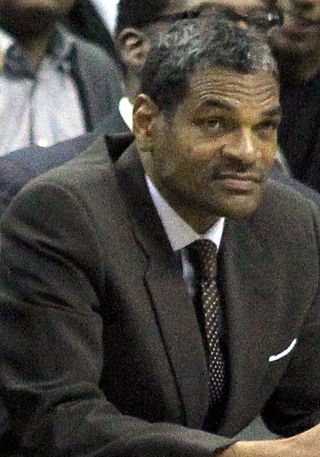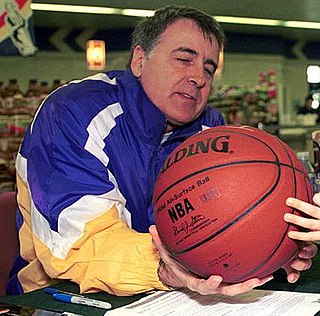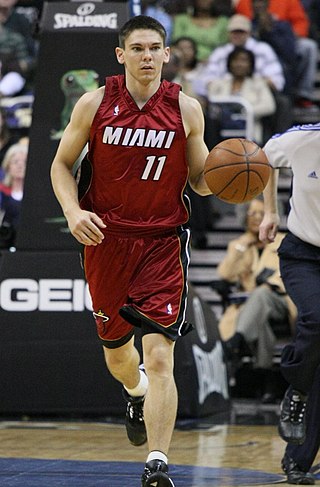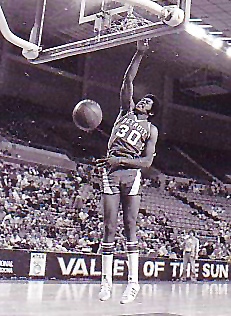
Jason Frederick Kidd is an American professional basketball coach and former player who is the head coach for the Dallas Mavericks of the National Basketball Association (NBA). Widely regarded as one of the greatest point guards and passers of all time, Kidd was a 10-time NBA All-Star, a five-time All-NBA First Team member, and a nine-time NBA All-Defensive Team member. He won an NBA championship in 2011 as a member of the Dallas Mavericks and was a two-time gold medal winner in the Olympics with the U.S. national team in 2000 and 2008. He was inducted as a player into the Naismith Memorial Basketball Hall of Fame. In October 2021, Kidd was honored as one of the league's greatest players of all time by being named to the NBA 75th Anniversary Team.

Rasheed Abdul Wallace is an American basketball coach and former professional player. A native of Philadelphia, Wallace played college basketball at the University of North Carolina before declaring for the draft in 1995. He played 16 seasons in the National Basketball Association (NBA).

Timothy Duane Hardaway Sr. is an American former professional basketball player. Hardaway played in the National Basketball Association (NBA) for the Golden State Warriors, Miami Heat, Dallas Mavericks, Denver Nuggets and Indiana Pacers. He was a five-time NBA All-Star and All-NBA Team selection. Hardaway won a gold medal with the United States national basketball team at the 2000 Summer Olympics. He was known for his crossover dribble which was dubbed the "UTEP two-step" by television analysts.

Maurice Edward Cheeks is an American professional basketball coach and former player who serves as assistant coach for the Chicago Bulls of the National Basketball Association (NBA). He has also served as head coach of the Portland Trail Blazers, Philadelphia 76ers, and Detroit Pistons. Cheeks was inducted into the Naismith Memorial Basketball Hall of Fame as a player in 2018.

Gail Charles Goodrich Jr. is an American former professional basketball player in the National Basketball Association (NBA). He is best known for scoring a then record 42 points for UCLA in the 1965 NCAA championship game vs. Michigan, and his part in the Los Angeles Lakers' 1971–72 season. During that season the team won a still-record 33 consecutive games, posted what was at the time the best regular season record in NBA history, and also won the franchise's first NBA championship since relocating to Los Angeles. Goodrich was the leading scorer on that team. He is also acclaimed for leading UCLA to its first two national championships under the legendary coach John Wooden, the first in 1963–64 being a perfect 30–0 season when he played with teammate Walt Hazzard. In 1996, 17 years after his retirement from professional basketball, Goodrich was elected to the Naismith Memorial Basketball Hall of Fame.

Rodney Strickland is an American basketball coach and former professional basketball player. He is currently the head coach at Long Island University. Prior to LIU, he served as the program manager for the NBA G League's professional path. Strickland played college basketball at DePaul University, where he was awarded All-American honors. He then enjoyed a long career in the National Basketball Association (NBA), playing from 1988 to 2005. Strickland was an assistant coach for the South Florida Bulls, under Orlando Antigua from 2014 to 2017. He formerly served in an administrative role for the University of Kentucky basketball team under head coach John Calipari and was the director of basketball operations at the University of Memphis under Calipari. He is the godfather of current NBA player Kyrie Irving.
Tracy Lamont Murray is an American former professional basketball player who works as an analyst with the UCLA Sports Network for all of the games during the UCLA Bruins' basketball season. Tracy is also a part-time analyst on the Slam Dunk Show on ABC7 Los Angeles. He worked as an assistant coach for the Los Angeles Lakers of the National Basketball Association (NBA) for the 2015–16 NBA season.
Christopher Joseph Ford was an American professional basketball player and head coach in the National Basketball Association (NBA). Nicknamed "the Mad Bomber", Ford played most of his NBA career on the Detroit Pistons, before finishing his playing career at the Boston Celtics. In the Celtics' season opener in 1979–80, he was credited with making the first official three-point shot in NBA history. He won an NBA championship with the Celtics in 1981.

Christopher Quinn is an American professional basketball coach and former player who is the top assistant coach for the Miami Heat of the National Basketball Association (NBA).
Jimmy Allen Oliver is an American former professional basketball player who played several seasons in the National Basketball Association (NBA). He was selected by the Cleveland Cavaliers in the second round of the 1991 NBA draft.

Thomas Ray Williams was an American professional basketball player who played in the National Basketball Association from 1977 to 1987. Born in Mount Vernon, New York, he was the younger brother of Gus Williams, who also played in the NBA.
Eric Money is an American former professional basketball player.
Dennis Boyd is an American former professional basketball player.
The 1977–78 NBA season was the Detroit Pistons' 30th season in the NBA and 21st season in the city of Detroit. The team played at Cobo Arena in Detroit.
The 1972–73 NBA season was the Detroit Pistons' 25th season in the NBA and 16th season in the city of Detroit. The team played at Cobo Arena in downtown Detroit.
The 1974–75 NBA season was the Detroit Pistons' 27th season in the NBA and 18th season in the city of Detroit. The team played at Cobo Arena in downtown Detroit.
The 1975–76 NBA season was the Detroit Pistons' 28th season in the NBA and 19th season in the city of Detroit. The team played at Cobo Arena in downtown Detroit.

The 1976–77 NBA season was the Detroit Pistons' 29th season in the NBA and 20th season in the city of Detroit. The team played at Cobo Arena in Detroit.
The 1985–86 NBA season was the Detroit Pistons' 38th season in the NBA and 29th season in Detroit. The team played at the Pontiac Silverdome in suburban Pontiac, Michigan.
The 1952–53 NBA season was the Pistons' fifth season in the NBA and 12th season as a franchise.








